Показать сокращенную информацию
Tolerance of Philippine native chicken to Makabuhay plant (Tinospora rumphii Boerl) stem extract capsule
| dc.contributor.adviser | Cabarles, Jaime Jr | |
| dc.contributor.author | Ramirez, Ethan L. | |
| dc.date.accessioned | 2021-07-06T01:32:05Z | |
| dc.date.available | 2021-07-06T01:32:05Z | |
| dc.date.issued | 2019 | |
| dc.identifier.citation | Ramirez, E. L. (2019). Tolerance of Philippine native chicken to Makabuhay plant (Tinospora rumphii Boerl) stem extract capsule (Unpublished Special paper). Central Philippine University, Jaro, Iloilo City. | en_US |
| dc.identifier.uri | https://hdl.handle.net/20.500.12852/1163 | |
| dc.description | Abstract only | en_US |
| dc.description.abstract | The commercialized world nowadays calls for a healthy consumption of food and encourages producers to go back to the basics. Anthelmintic activities of makabuhay stem extracts (MSE) are best alternatives to synthetic medicines that will provide farmers cheap and accessible sources for maximum productivity in poultry raising. This study aimed to determine the tolerance of Philippine native chicken to makabuhay plant (Tinospora rumphii B.) stem extract capsule. The utilization of makabuhay stem extracts (MSE) in this study was based from a previous study conducted which revealed that MSE was effective against Ascaridia galli. Thus, the makabuhay stem extracts processed into capsules were utilized in this study to determine the dose that can be tolerated by the Philippine native chickens. Any changes were recorded through photos or videos and were noted upon administering the treatment. Eighteen Philippine native chickens were introduced with three different dosage allocating 6 chickens for each treatment set. The first set of chickens were administered with a base dose of 350 mg MSE capsules, the second set with 700 mg MSE capsule and the third set with 1400 mg MSE capsules. The birds were observed individually with their respective treatment dosage during the first 30 minutes then periodically for 4 hours within the 24-hour test. The dosages were further increased when the test chickens survived the base dose. The test revealed that the chickens survived even the highest dose of 1400 mg indicating that the MSE is likely to be nontoxic. | en_US |
| dc.format.extent | vii, 22 leaves | en_US |
| dc.language.iso | en | en_US |
| dc.rights | Attribution-NonCommercial-NoDerivs 3.0 Philippines | * |
| dc.rights.uri | http://creativecommons.org/licenses/by-nc-nd/3.0/ph/ | * |
| dc.subject.ddc | Filipiniana Theses 630.72 R145 | en_US |
| dc.subject.lcsh | Plant extracts | en_US |
| dc.subject.lcsh | Chickens | en_US |
| dc.title | Tolerance of Philippine native chicken to Makabuhay plant (Tinospora rumphii Boerl) stem extract capsule | en_US |
| dc.type | Special paper | en_US |
| dc.description.bibliographicalreferences | Includes bibliographical references | en_US |
| dc.contributor.committeemember | Patricio, Hope G. | |
| dc.contributor.department | College of Agriculture, Resources and Environmental Sciences | en_US |
| dc.description.degree | Bachelor of Science in Agriculture | en_US |
| local.subject | Native chicken | en_US |
| local.subject | Makabuhay plant | en_US |
| local.subject.scientificname | Gallus gallus | en_US |
| local.subject.scientificname | Tinospora | en_US |
| local.subject.scientificname | Tinospora rumphii | en_US |



